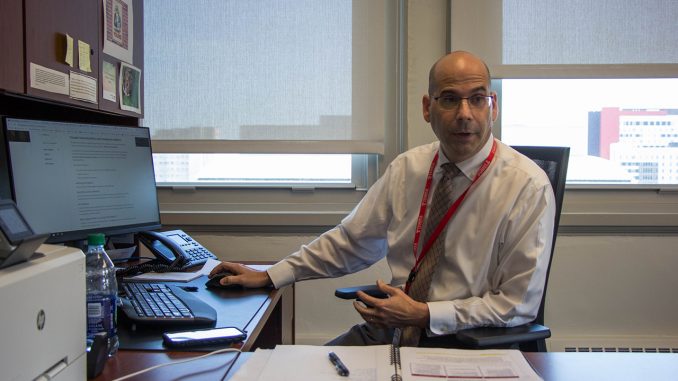
Temple’s ethics helpline has received 31 tips since its inception in May, said Alejandro Diaz, the university’s chief compliance officer.
The university established the Ethics and Compliance Office in the wake of the Fox School of Business rankings scandal last year, which erupted after the university announced that the school had submitted falsified rankings data for several of its programs, triggering investigations from the U.S. Department of Education and the Pennsylvania Attorney General’s Office.
Anyone at Temple can contact the 24/7 helpline, which is managed by NAVEX Global, an ethics and compliance technology company, Diaz said. Tipsters have a confidential, two-way conversation with Diaz, and the office will determine whether it falls under their jurisdiction or that of another office, he said.
The five-person office has not received complaints of employee-to-employee retaliation or conflicts of interest, which have to be reported to Temple’s Board of Trustees, Diaz said. Instead, they have mainly dealt with complaints that are investigated by other departments, like human resources or the university counsel, Diaz said.
“We let the experts already at the university on the subject matter investigate this stuff,” Diaz said. “We use them as sort of our arms and legs for investigating, and that makes sense because we’re sort of a small group here.”
The helpline received 24 calls between May and August, and seven in September, Diaz wrote in an email to The Temple News.
Jon Smollen, the executive director of the Beasley School of Law’s Center for Compliance and Ethics, an education and research center, said that having a visible, well-defined way of having ethical issues raised, like a helpline, is “healthy” and “productive” for any organization.
“It gives the employees a sense of there being clarity of where you go at a central level, and there’s also the clarity that an organization is saying it’s important that those questions get asked, that the issues get raised,” said Smollen, who previously worked as a chief compliance officer for a pharmaceutical company.
It is also common to have tipsters raise issues through ethics helpline that are outside the purview of a compliance department, Smollen said.
“You’d almost be a clearinghouse where [the issues] would come in, they would get logged, and they would get sent out to a particular part of the organization to look at the particular issue where they would have the expertise and knowledge of it,” he added.
In an October 2018 release, Temple referenced Diaz’s appointment to chief compliance officer as part of a series of measures designed to prevent a situation, like the rankings scandal, from happening again.
“I do think the lifeblood of ethics and compliance is people willing to speak up,” Diaz said. “Think about it this way: If misconduct is observed and not reported, that’s a missed opportunity for us to learn. Because correcting a mistake, that’s how you learn.”


Be the first to comment